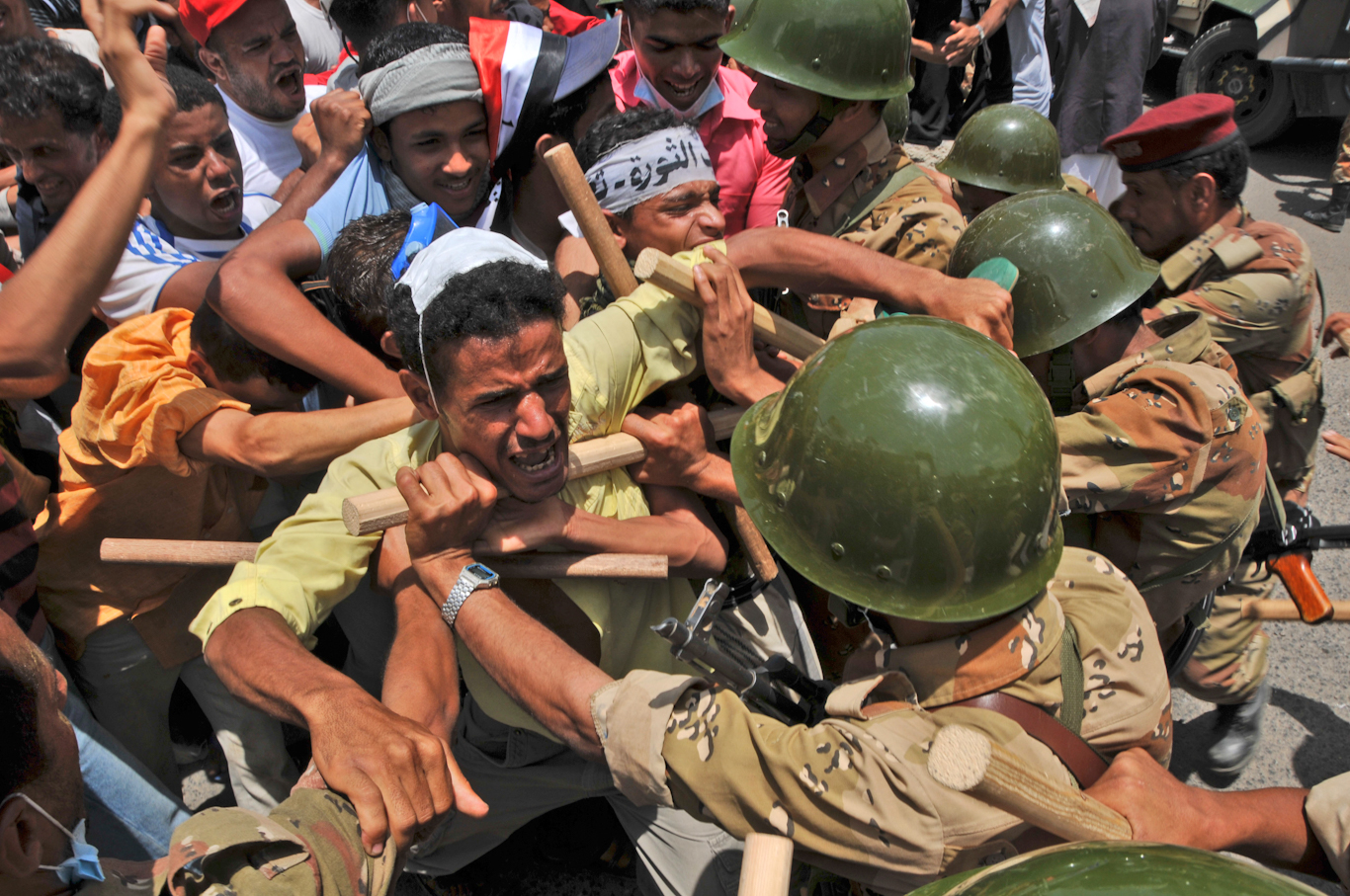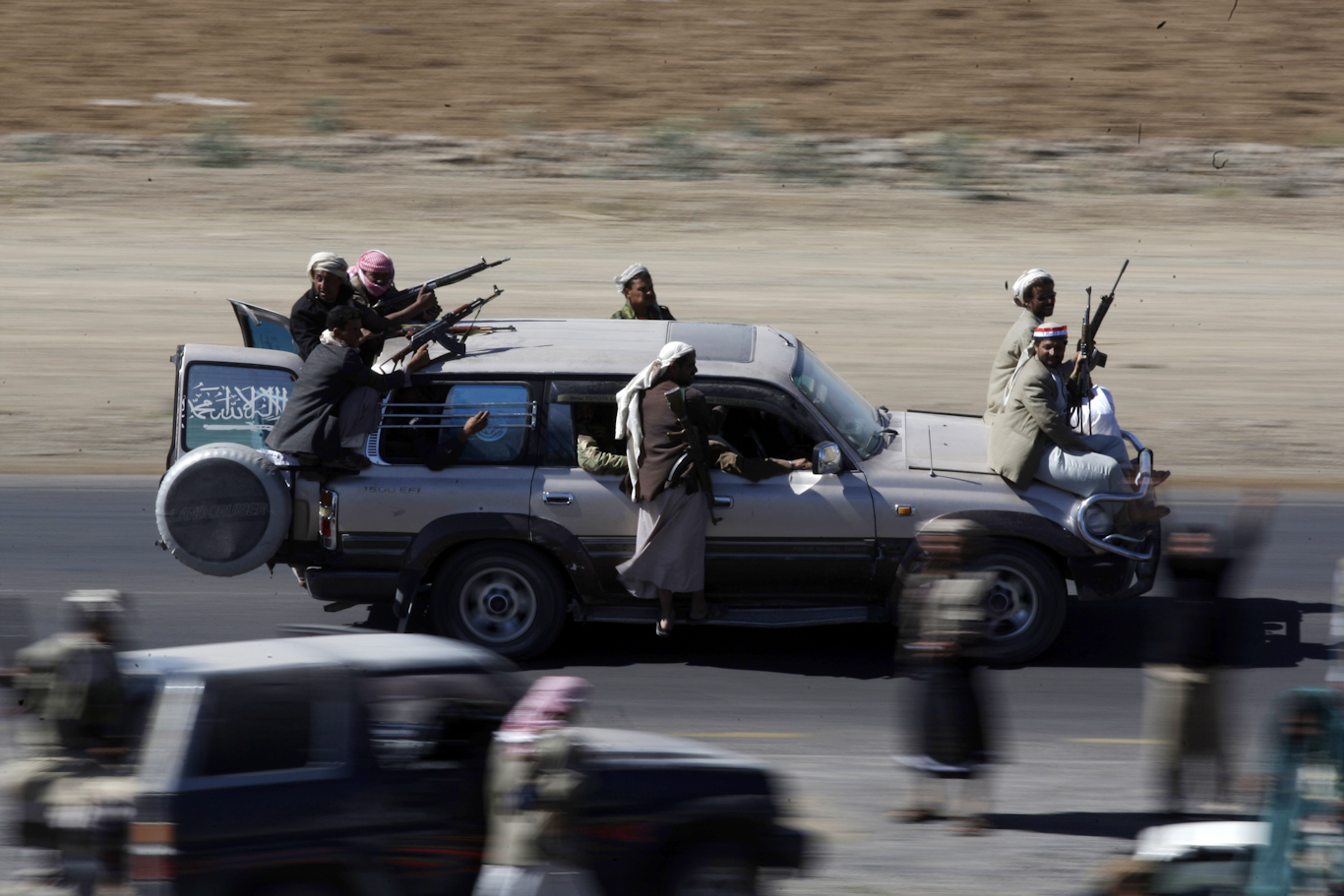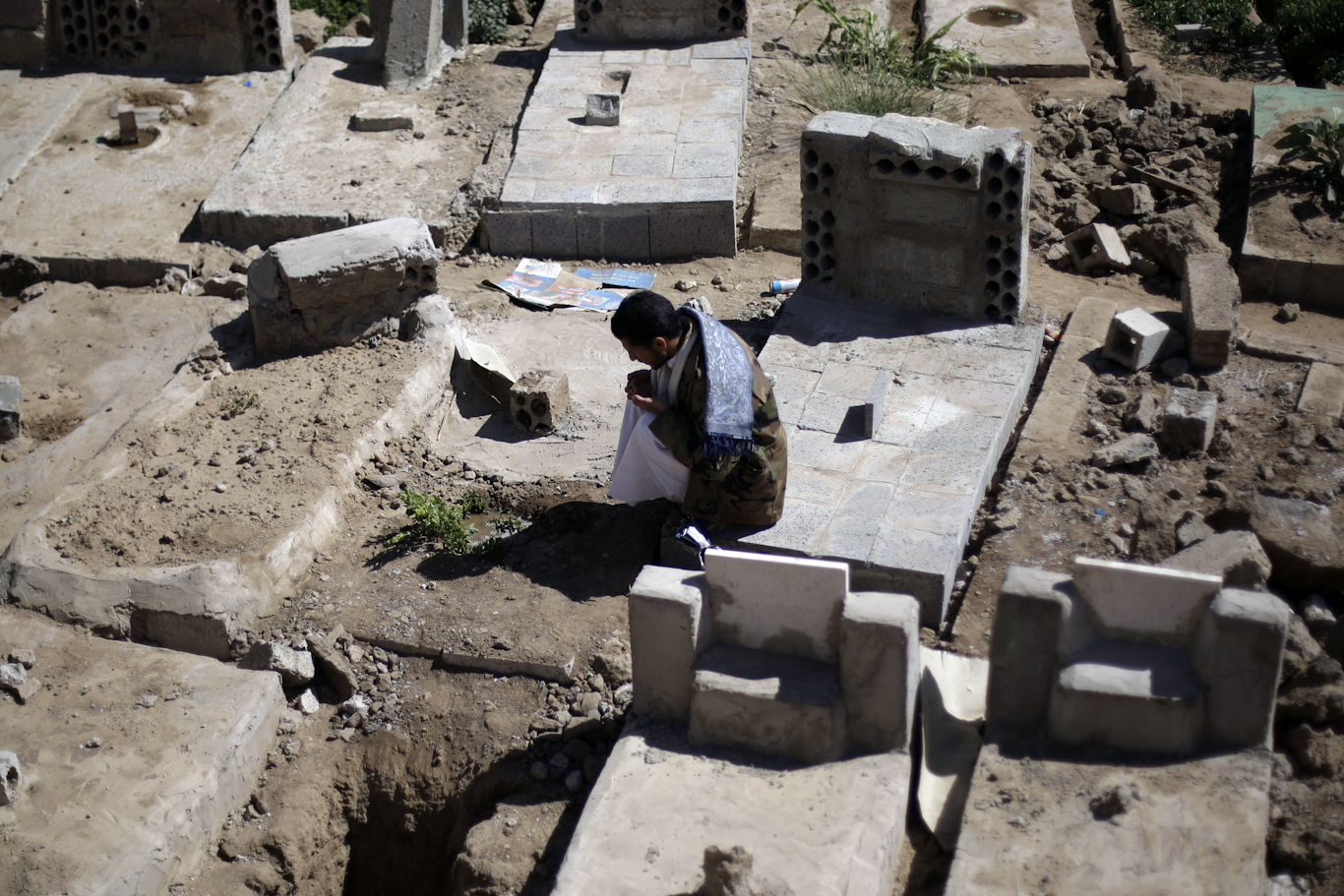SANA’A, YEMEN — A decade has passed since a massive popular uprising was sparked in Yemen by the wave of pro-democracy protests surging across the Middle East and North Africa known as the Arab Spring. The protests called for the overthrow of dictatorial regimes and sought democracy, sovereignty, and the elimination of poverty and unemployment. For Radwan Ali al-Haimi, a Yemeni youth and one of the leaders of the uprising, the hope for a new era of freedom and democracy cannot be crushed by Saudi Arabia and will come true with time.
In early 2011 — in a square in Yemen’s capital city of Sana’a just outside of Sana’a University, in an area dubbed Change Square — thousands of people gathered to demand the overthrow of Saudi-backed strongman Ali Abdullah Saleh, who had held power for more than three decades. The square was transformed into a sea of tents, flags, and banners. Despite the difference in their affiliations, all of the protesters slept, ate, chatted and chanted together, all the while peacefully calling for the end of a regime they viewed as corrupt, oppressive, and a mortgagee of Saudi Arabia.
The scale of the protests was rarely seen in Yemen before the uprising. “Our uprising aimed to overthrow the corrupt regime. We were looking to create a modern civil state, equality, a national army, sovereignty, and to liberate our homeland from Saudi tutelage,” Radwan — who had become a voice of the revolution — told MintPress.
A decade of oppression and destruction
For a decade, Saudi Arabia has worked to ensure Yemen’s steady dissolution from a nation hoping to transition to democracy during the Arab Spring to a nation fragmented by war and military intervention — a land of warring statelets, mass suffering, and despair. Today, Yemenis are living in worse conditions than they were before 2011, thanks in large part to Saudi oil riches.
While some leaders of Yemen’s youth-led revolution ended up as refugees or among the ranks of al Qaeda or ISIS, or as mercenaries of necessity allied with Saudi Arabia in order to earn a living, most continued their struggle for independence.

Soldiers push back protestors demanding the resignation of Yemeni President Saleh in Taiz, Yemen, April 9, 2011. Yemen Lens | AP
Many of the youth that participated in the uprising told MintPress that they place some blame on all of Yemen’s political forces for the failure of their movement, but most of their ire is reserved for Saudi Arabia.
“Saudi Arabia has crushed our revolution, turned our lives into hell because our uprising was interpreted by the ruling family as a threat to [their] influence and because of their fear of the revolution spreading to the Saudi interior,” artist Aisha Ali Saeed told MintPress. Aisha joined the youth revolution hoping for a decent life; instead, she now struggles to secure her next meal.
Bottling up the uprising
After the Arab Spring revolutions in Egypt and Tunisia took down their respective Saudi-backed strongman leaders, Riyadh devoted itself to encircling Yemen’s youth revolution there and maintaining its paternalistic role and influence over its southern neighbor. In fact, just months after the outbreak of the uprising (which bore the slogan of independence and sovereignty as one of its goals), Saudi Arabia flew Saleh and members of the youth-led opposition to Riyadh. A power-sharing political settlement was signed in November 2011 dubbed the GCC Initiative.
The initiative not only granted Saleh unconditional immunity, but it also replaced him with then-Vice President Abdu Rabu Mansour Hadi, who was more loyal to Saudi Arabia. Hadi, a southern military leader, had been appointed by Saleh in the wake of the 1994 war as a reward for betraying the South and likely because his inefficiency and weakness of personality posed little threat to Saleh. To this end, the GCC initiative included a number of anti-democratic mechanisms, including presidential elections with Hadi as the only name on the ballot.
Saudi Arabia’s claim of legitimacy for Hadi’s presidency is tenuous at best. In the wake of the one-candidate election in 2012, Hadi overstepped his mandate, which was supposed to be just two years long. His two-year term was extended for one year in 2014 and, following mass protests in the wake of rising fuel prices, Hadi fled the capital south to Aden and then eventually on to Riyadh after submitting his resignation to the House of Representatives. That resignation was used as a pretext to invite foreign intervention in March 2015. Now, Hadi’s term as propped-up president has become indefinite.
Youth and Houthi alliance
To many of the participants in Yemen’s youth movement, it was clear that their demands had been swept aside. Not only by the political parties known as “the Joint Meeting Parties” — led by the Islah Party, the Muslim Brotherhood’s branch in Yemen — but also by the United States and Saudi Arabia, which were pursuing their own agendas in Yemen and gave Hadi international legitimacy. Without an ally or a movement, many of the participants of the youth revolution did not stand by while their dreams faded. Instead, they decided to close ranks behind Ansar Allah (Houthis), a partner who rejected the GCC Initiative and saw it as little more than an attempt to crush the Arab Spring in Yemen.

Houthi fighters escort protesters during a four-day march from Taiz to Sanaa demanding the prosecution of Saleh, Dec. 23, 2011. Hani Mohammed | AP
The Houthis were committed to the principles of the revolution that had sparked the initial uprising in 2011, and together they thwarted the Gulf Initiative and continued to organize rallies and demonstrations until the United Nations-sponsored National Dialogue Conference in 2013. The conference included disenfranchised representatives from the youth movement, the Houthis, and the Southern Movement — all parties that were excluded from the Gulf Initiative.
Saudi sabotage, airstrikes, fail to quench Yemeni determination
Instead of entering the talks inspired by goodwill, and respecting Yemen’s sovereignty and bridging points of view between the various parties, Saudi Arabia further polarized and torpedoed the nearly year-long National Dialogue Conference, which was meant to bring Yemen’s various factions to a consensus on how to address the country’s most pressing issues. The Kingdom attempted to impose a six-region federation of Yemen, a move that was refused by the conference’s other parties, which saw it as a project to break up the country.
Still, Yemeni parties were close to signing a settlement under the auspices of the United Nations when the Kingdom of Saudi Arabia surprised the world by launching Decisive Storm in March 2015. Jamal BenOmar — the former UN envoy to Yemen, who worked with former U.S. president Jimmy Carter on human rights issues — confirmed that a political deal was close before the Saudi airstrikes began.

The young relative of a protester killed in clashes with security forces prays next to his grave in Sanaa, Yemen, Dec. 30, 2011. Hani Mohammed | AP
Chants of independence and patriotism were not the only factor for Saudi Arabia. The Kingdom was driven by concerns that, should new players be empowered, ones with whom Riyadh was not experienced in dealing, the result could lead to unforeseen and uncontrollable developments in Yemen. Hence, the first motives for their fierce war against the country in 2015. This Saudi approach, however, failed to take into consideration how the youth revolution had merged with Ansar Allah and risen to prominence in a form fundamentally different from what the Saudis had previously known.
Like many members of his generation, Radwan took the street in Bab al-Yemen in the capital city of Sana’a on Friday to call for the liberation of areas still under the control of the Saudi Coalition forces — particularly the oil-rich Marib province, which is witnessing an unprecedented mobilization of youth volunteers, tribes and the Yemeni army to liberate it from the Saudis. Radwan declared, “We are determined to achieve the goals of our revolution, and we believe that victory is closer than ever.”
Feature photo | Protestors run through the streets holding peace signs during a demonstration demanding the prosecution of Yemen’s President Ali Abdullah Saleh in Sanaa, Yemen, Nov. 24, 2011. Hani Mohammed | AP
Ahmed AbdulKareem is a Yemeni journalist based in Sana’a. He covers the war in Yemen for MintPress News as well as local Yemeni media.
The post Futile: Saudi’s Decade-Long Attempt to Bottle Up Yemeni Youth Revolution is Failing appeared first on MintPress News.
